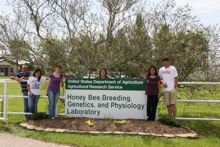2010 Press Releases
13.09.2010
The honey bee, Apis mellifera, is the most important pollinator of agricultural crops worldwide.
In recent years, populations of this species have declined significantly; mainly since the introduction of the parasitic mite, Varroa destructor. The Varroa mite is native to South-east Asia, its native host being the Asian bee Apis cerana. As a result of the worldwide movement of honey bees, however, the mite shifted host to Apis mellifera and has now spread throughout the world, to every continent except Australia. It was first detected in Ireland in 1998 and has brought about the almost complete loss of feral honey bee colonies.
Maria Kirrane, a PhD student with the School of Biological Earth and Environmental Sciences (BEES) and the Environmental Research Institute, is investigating the possibility of breeding for resistance mechanisms in Irish populations of the Dark European honey bee Apis mellifera mellifera.
Resistance mechanisms of the Asian bee include grooming behaviour, in which the bee removes the mite from its body, and hygienic behaviour, in which bees detect and remove brood cells infested with Varroa. Maria is funded by an IRCSET postgraduate scholarship for three years, and also a National University of Ireland Travelling Studentship.
Maria has just returned from two months working at the United States Department of Agriculture - Honey Bee Breeding, Genetics and Physiology Laboratory in Baton Rouge, Louisiana as a visiting student under Dr Lilia de Guzman and Professor Tom Rinderer. Researchers at this lab are working with Russian bees that have been exposed to the mite for the longest period and therefore display resistance mechanisms. They have also bred a resistant line of mixed-race bees, which express high levels of hygienic behaviour. While there, Maria undertook a number of experiments into the reproduction of Varroa destructor and the mechanisms of grooming behaviour. These will hopefully lead to a better understanding of these traits, thereby improving selection programmes.
Maria is supervised by Dr Pádraig Whelan and Dr Mark Emmerson.
Picture L-R: Tony Stelzer, Alyzza Prudente, Maria Kirrane, Melanie May, Dr Lilia de Guzman and Jeremy Wagnitz.
1548MMcS

